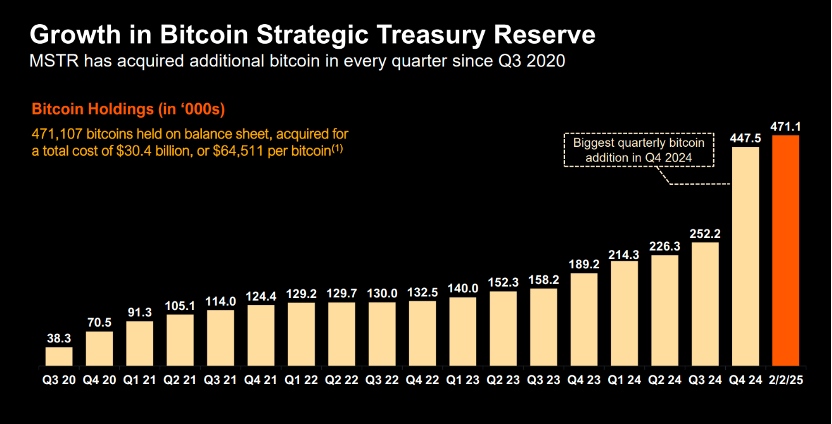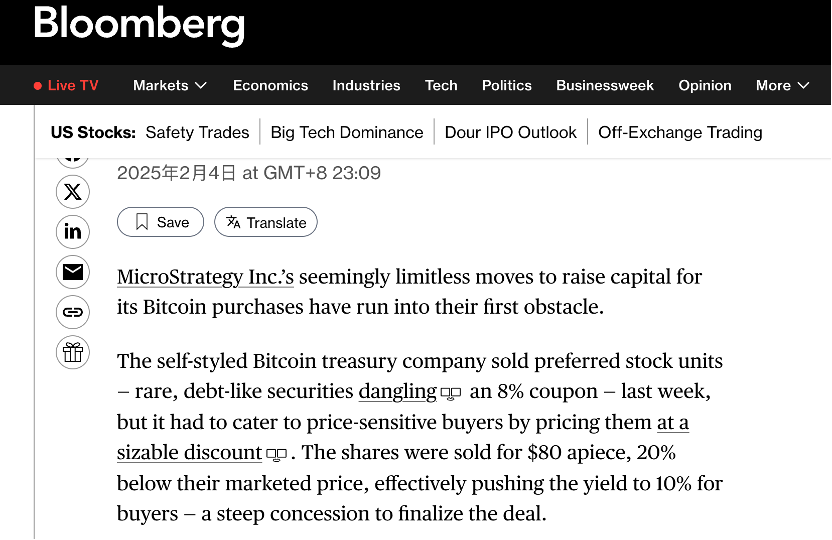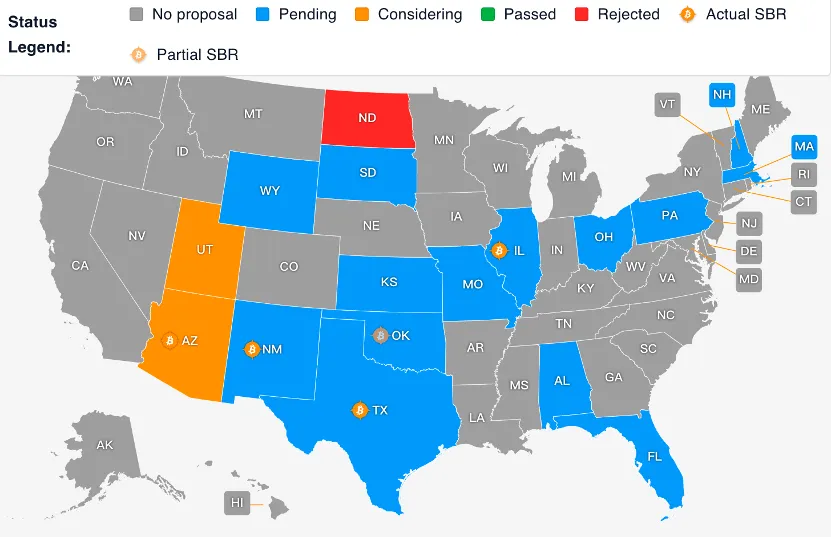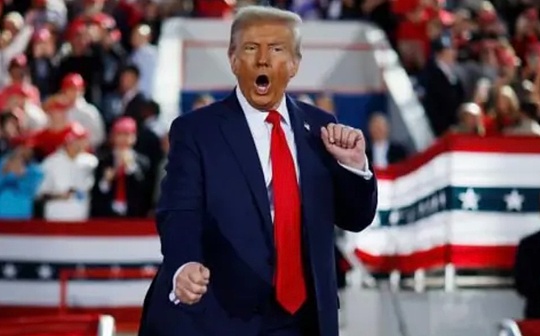When Trump takes office, why doesn’t micro-strategy “buy, buy, buy”?

Reprinted from panewslab
02/07/2025·14DText/Hedy Bi, OKG Research
Trump is taking the helm again, and political trends and economic policies are reshaping the global capital map at an astonishing speed. Against this background, the strategy company (formerly known as MicroStrategy, all expressed in the following text) - a listed company famous for its massive acquisition of Bitcoin, suddenly announced the suspension of new Bitcoin purchases. At the financial report meeting in the early morning of last night, Strategy set an annual "bitcoin dollar earnings" target of US$10 billion in 2025. Assuming that Strategy's funds for Bitcoin purchase are all derived from financing, to achieve this goal, either the price of Bitcoin doubles, or Strategy doubles its holdings at least with the existing holding costs under the theoretical condition that Bitcoin maintains its current price. .
As the world's largest enterprise-grade Bitcoin holder, as of February 7, 2024, Strategy held 450,000 Bitcoins, with an average cost of approximately US$62,000, ranking among the top five in global Bitcoin holders, accounting for about 50,000 Bitcoin holders. 2.38% of the total Bitcoin supply. This ratio is comparable to the official US gold reserves (World Gold Council), which ranks first in the central bank's gold reserves, and also shows Strategy's leading edge and strategic determination in the field of crypto assets. Because of this, Strategy 's transparency and clear investment strategy have made its position changes an important perspective for global investors to pay attention to cryptocurrencies.

For investors who are accustomed to seeing Strategy as a "digital gold treasury", the recent actions of Strategy have undoubtedly sparked heated discussion. How to interpret such a "heart-to-mouth" strategy? The author will analyze why Strategy changed its investment strategy for buying Bitcoin and the impact of this move will be analysed on the Bitcoin market.
Why did Strategy choose to suspend purchases after Trump took office? The answer is much more complicated than the surface. One of the key factors is the company 's recent pressure on performance and accounting treatment.
First, Strategy doubled its Bitcoin holdings in the fourth quarter of 2024, but recorded a net loss per share of $3.03, far exceeding analysts' expectations of $0.12, which is mainly attributed to the number held. Large impairment treatment of assets. According to old accounting standards, when the price of Bitcoin falls below its purchase cost, the company needs to reflect this part of the loss in its financial statements. If the fair value of the asset is lower than its book value, an impairment loss must be recognized.

Such overexpected losses will reduce investors' confidence in the company, resulting in them demanding higher returns to take investment risks and making it more difficult to attract investors to buy their preferred shares. Therefore, we see that according to Bloomberg, Strategy is sold at a discount of 20% Newly issued preferred shares. However, for investors who are optimistic about the prospects of Strategy, discount issuance effectively increases buyer yields.

Meanwhile, while the implementation of the new FASB (Financial Accounting Standards Board) standards allows Strategy to confirm the unrealized gains of its Bitcoin position for the first time, it complicates the tax problems it faces: According to the new accounting standards, Strategy needs to measure its holdings of Bitcoin at fair value and reflect unrealized gains on its financial statements. While this makes the balance sheet more transparent, it also means that companies may need to pay a company alternative minimum tax (CAMT, about 15% tax rate) for these unrealized gains. Facing potentially huge tax bills, Strategy must conduct financial planning to deal with tax obligations. Suspension of purchases may be a financial risk control tool to better assess and manage future tax burdens.
In addition, since the company was included in the Nasdaq 100, it has to comply with stricter information disclosure and corporate governance requirements, including stricter internal trading policies to prevent insider trading. One of the reasons for the suspension of Bitcoin’s increase may be related to the restrictions on the ban period. Although the Securities and Exchange Commission (SEC) does not mandate companies to set up a lock-up period, many companies will actively set it out for compliance reasons, especially before and after the release of financial reports. For example, Strategy's fourth-quarter 2024 financial report was released on February 5, and the lockdown period may begin in January, thus limiting its Bitcoin increase during this period.
Simply put, Strategy does not lose confidence in the prospects of Bitcoin, and the performance of "different feelings" is not affected by external market factors, but more due to its own internal financial compliance and other reasons.
Other institutions in the market will not choose to follow because of Strategy's own reasons. On the contrary, the United States, represented by states, is implementing Bitcoin from the bottom up, which can become a strategic asset at the state level. Currently, 16 states have submitted relevant bills, and two of them are making rapid progress. According to the figure below, 28,312 Bitcoins are likely to be purchased for investment. And states in "Pending" states do not mean they are not supporters of digital currencies such as Bitcoin. Just today (February 7), Kentucky Rep. TJ Roberts initiated the HB376 bill, proposing to invest 10% of state funds in digital assets with a market value of over $750 billion.

According to Kentucky's 2023 State Fund revenue, 10% of the funds are put into Bitcoin investment, which is about $1.51 billion. If all 16 states use this data as a reference, about $24 billion of funds flow into the Bitcoin market. This fund is almost equivalent to 1.25% of Bitcoin’s current market value (as of February 7), and also to 3.24% of the U.S. gold reserves. According to the World Gold Council, the value of the U.S. gold reserves is about $740 billion. This scale of capital inflow has not yet passed the background of any national reserve construction, but is driven purely by the policy of the state government. This means that other institutions or governments are also making Bitcoin purchases, besides companies like Strategy. In less than a month since Trump officially moved to the White House again, Bitcoin's position in the global financial system is constantly improving at a speed that is both unconventional and unprecedented.
And this is just a microcosm of the new policy of the Trump era, full of uncertainty but also full of imagination.

 chaincatcher
chaincatcher

 jinse
jinse